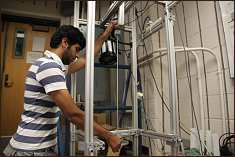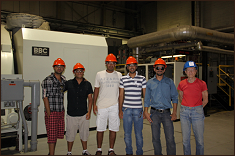
|
 |
Salim working in the Vibration Lab |
|
In the fourth year of the EERC Summer Internship program, five PI students—four undergraduates and one graduate student—were sponsored by four UMD professors. Each student worked with a UMD professor and graduate student supervisors on active EERC research projects. Our summer interns gained valuable hands-on experience in the labs while working with professors and students from culturally diverse backgrounds. Students also spent their free time exploring cultural, historical and scientific hallmarks, such as the White House and monuments in Washington D.C. The students also visited Baltimore’s Wheelabrator Technologies to see a waste-to-energy facility in action.
Following is a summary of the research projects and tasks during the six-week internship of the five students this summer. In addition to the students listed below, Adeel Butt participated in the program as a graduate student working with Dr. Ali Al Mansoori at PI and Dr. Shapour Azarm at UM.
Student: Salim Al Kaabi, Electrical Engineering Student
Professor: Sarah Bergbreiter
Project: Microrobotics
Salim worked in Dr. Sarah Bergbreiter’s laboratory, where Dr. Bergbreiter is conducting research on a new class of networked centimeter and millimeter sized mobile robots. To develop this new class of robots, she is working on solving problems with microrobotic locomotion, low-power and efficient actuators, and novel fabrication techniques. She hopes to adapt the technologies used by these tiny robots for use in medicine, consumer electronics, and science.
Salim’s task was to work on detecting robots using a gyroscope and accelerometer. He was tasked with providing a C++ code that would help in integration of the acceleration data. He also used MatLab, gathered and analyzed experimental data, investigated the noise problem using a Mini-Kit CC2530 ZNP, and worked on optical sensors.
Salim believes that the theory covered in his PI coursework helped him understand the issues in this research. He also found that the environment at UMD enhanced his learning because he was surrounded by hard-working students, all of whom he found to be friendly and kind. He believes the internship experience is important for undergraduate students considering graduate studies because it provides a taste of what graduate studies are like and the amount of work that is required.
Student: Reda Mohamed El Sholkami, Chemical Engineering Student
Professor: Dr. A.K. Gupta
Mentor: Mr. H. Selim
Project: Sulfur Recovery from Gas Stream using Flameless and Flame Combustion
Reda Mohamed was sponsored by Prof. A.K. Gupta to work in the combustion laboratory for his summer internship. Dr. Gupta’s research is concerned with combustion, and in particular, his EERC project is concerned with the thermal process of sulfur recovery from sour gas by conventional flame combustion as well as flameless combustion. Reda’s task was to obtain fundamental knowledge on the Claus process. He learned about the effect of the compositions of CO2 and N2 on the optimum temperature in the Claus process and about a novel error propagation approach for reducing the H2S/O2 reaction mechanism.
Additionally, Reda was able to use CHEMKIN and FLUENT software for reactive simulations and to compare the obtained simulation results with the experimental results. He was also introduced to the experimental work of the project. This included learning how to work safely in the laboratory, mainly due to the hazardous gases involved in the experimental work of this research project, such as H2S.
Reda liked the fact that the graduate students appreciated the effort and time he put into performing his work. He was also able to observe the way all the graduate students and Dr. Gupta helped his student prepare and rehearse for his Ph.D. exam. He enjoyed the research environment, specifically having the opportunity to focus on a particular problem and try to generate the best possible solutions.
Students: Salim Saeed Al Qayedi and Fawad Muhammad Taqi, Mechanical Engineering Students
Professor: Dr. B. Balachandran
Mentors: Dr. Balachandran (Fawad) and Mr. Nick Vlajic (Salim)
Project: Dynamics and Control of Drill Strings
Both Salim Algavedi and Fawad worked with Dr. Balachandran in the Vibration Laboratory for their internship. This laboratory is a focal point for studies of nonlinear phenomena, system identification, signal analyses, acoustics control, damping, and vibration control, with particular emphasis on mechanical, aerospace, and marine systems. The interns were tasked with understanding concepts such as correlation trends, outlier points, regression analysis, digital data acquisition, spectral analysis, signal processing, Discrete Fourier Transform (DFT) and Fast Fourier Transform (FFT). They had to use MatLab, analyze data, and apply filtration techniques.
They also did some experiments on the drill string. Their task was to gather data from the torque sensor and apply FFT and filtration techniques to remove noise using a data acquisition card and LabView software. They also used Virtual Instrumentation Engineering Workbench software and Solidworks to perform Finite Element Analysis (FEM) of drill strings.
Selim and Fawad believe that their training in the LabView software will contribute be useful for their senior design projects at PI next year. Fawad also found that the task of modeling and FEM in Solidworks clearly showed the relationship between industrial experience and the theory they have covered in their PI coursework. The modeling and analysis techniques they learned at PI were vital in creating this model. Learning this CAD software has added to the lifelong skills they will use as engineers.
Fawad and Salim were both impressed by the diligence and self-motivation of the graduate students, showing that the students are dedicated to their work and motivated by themselves to do it as opposed to being pressured into completing their jobs. Salim also admired the IT department’s technique to help students use different online programs without the need to download them. This allows the students to complete their work anywhere without the need to install these programs.
Student: Adeel Butt, Graduate Chemical Engineering Student
Professor: Shapour Azarm
Project: Integration of Engineering and Business Decisions for Robust Optimization of
Petrochemical Systems
 Adeel Butt, a PI graduate student in the Chemical Engineering Department, came to Maryland for a six-week internship. His research training plan was focused on refinery simulation model development and optimization implementation. The overall objective of the project Adeel worked on is to develop a framework for integrating engineering and business decisions. In this quarter, their research efforts continued to extend the dashboard-based Decision Support System (DSS) by considering the crude oil processing units in the refinery. Adeel Butt, a PI graduate student in the Chemical Engineering Department, came to Maryland for a six-week internship. His research training plan was focused on refinery simulation model development and optimization implementation. The overall objective of the project Adeel worked on is to develop a framework for integrating engineering and business decisions. In this quarter, their research efforts continued to extend the dashboard-based Decision Support System (DSS) by considering the crude oil processing units in the refinery.
Image caption: From left, Fawad Taqi, Reda Mohamed, Salim Al Kaabi, Salim Al Qayedi, and Adeel Butt and the Wheelabrator operator visiting Wheelabrator Technologies in Baltimore.
November 9, 2011
|

